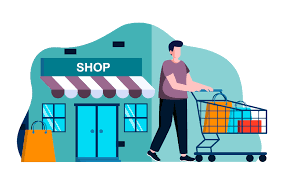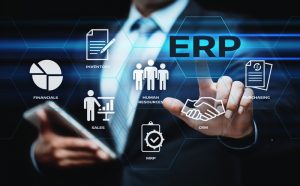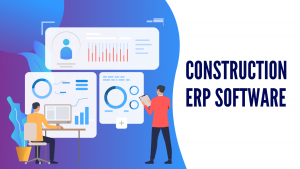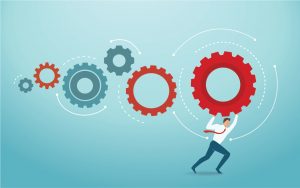ERP for Retail : As one of Ireland’s leading ERP consulting services, Connected IT Consulting assists retail organizations of all types and sizes to become more competitive, through the integration of appropriate retail ERP systems.
Consumers worldwide are turning to the internet as their main source of information. It has become their favorite shopping environment. The level of competition amongst businesses continues to grow exponentially. And it is perhaps within the retail shopping environment, that competition is now the most intense.
Retailers of all sizes and types are facing greater competition and pressure on profit margins, especially those who rely on high volumes from loyal customers. To counteract this, businesses are being forced to become more innovative and to find ways of improving business efficiency.
Driving efficiencies and streamlining businesses is exactly what ERP (Enterprise Resource Planning) is all about and there are many features of retail ERP systems that can be of huge benefit to complex retail organizations of all sizes and types.
THE ROLE OF ERP IN THE RETAIL ENVIRONMENT
Modern consumers have become spoilt for choice and expect instant gratification from companies that they choose to deal with. More importantly, they expect this across all channels that they interact on, whether it be mobile devices, on social media or at physical retail stores. This makes efficiencies harder to manage.
ERP software aligns various separate business functions, and is the answer to most of these challenges. By drawing live information from different business functions into a single source and providing a wholistic view of operations, ERP allows for better, faster decision making and more efficient use of resources.
That is why ERP has become a go-to strategy for businesses seeking to get a handle on the fast changing environment and wherever possible, to find a competitive advantage in overall business efficiency.
KEY FEATURES OF ERP FOR RETAIL BUSINESS
A well-implemented ERP system has the ability to integrate the whole business process and to provide a seamless experience for customers from the time that they start searching for information online, to placing an order, making payment, receiving delivery and even replacing a defective product, if so required.
As a retail business, the following are some of the outstanding features that you can expect from ERP:
Financial Management
Financial management becomes easier and more accurate, because the system replaces many of the manual tasks that can lead to mistakes. Financial information is instantly available for any area of the business, allowing for a complete overview of the current financial situation.
The system is capable of providing comprehensive reports covering any area of finance, including balance sheets, income statements, cashflow reports, marketing budgets, ageing analysis, debtors & creditors and the like.
Inventory Management
This feature is particularly important for retail, because it enables end-to-end data and logistics for the whole retail operation. This includes being able to accurately predict consumer demand and manage stock levels, based on past history.
The feature benefits supplier relationships, because suppliers are able to better service the retail customer, based on more accurate estimates and demand assumptions.
Customer Account Management
Having detailed records of customer interactions and purchase habits can be very beneficial to retail businesses, because it allows for pro-active sales and marketing initiatives.
Maintaining accurate customer records is made easier with ERP. Creating new client profiles, keeping up-to-date records, recording purchase histories, and even managing loyalty programmes that reward individual customers based on specific criteria, can all be managed on the system.
Multi-Channel Order Management
Visibility of inventory in real-time and consolidation of information at a single point, makes it possible to efficiently manage orders and to monitor inventory across multiple sales points and marketing channels.
This means that orders can be fulfilled from any point in the supply chain, for instance on ecommerce websites, at physical retail stores, pop-up counters or even special promotional events.
Sales Order Management
Sales orders can be monitored at every point in the pipeline, from purchase to delivery and back again if necessary. ERP replaces the need for manual involvement in many instances. This allows for more accurate capturing of information and fewer mistakes in dispatching and distribution. The process can continue 24/7.
Reportint
Reporting features provide in-depth analysis and reporting, giving an instant picture of the business situation. Various business tools enable monitoring of key performance indicators, such as Market Demand, ROI, cost of sales, warehouse management status, cybersecurity status reports, employee retention and the like.
Integrated Point-of-Sale(POS)
ERP software at point of sale enables better management of customer purchase history and information, product and inventory details and staff sales information. The system accesses the back-office system to improve day-to-day operations.
It also helps to simplify customer payments, whether they be made via application or physically at a counter. Hardware options that all work seamlessly with the ERP software include credit card readers, touchscreen monitors, barcode scanners and cash drawers.
HOW RETAIL ERP BENEFITS COMPANIES
While there are many reasons to invest in an ERP system, three overarching benefits stand out for the retail sector:
Centralisation of Information
High quality information from many areas of the business is centralised and helps to remove the silo mentality that so often exists in complex businesses. This allows businesses to react faster and in alignment with customer demand. Business becomes more dynamic and proactive.
Improved Customer Relationships
In the retail space, knowing your customer’s needs and creating personal relationships, is the most important aspect of marketing. ERP provides companies with the ability to collect live customer data from many sources and to react quickly to customer demands and current trends. This in turn leads to better relationships and increased customer loyalty.
Effective Inventory Management
ERP provides a better overview of demand and supply patterns. Companies can therefore plan raw materials and stock levels more efficiently, because they can better manage forecasting versus production output. This helps to alleviate over stocking and out-of-stock situations.
CONCLUSION
When it comes to success, choosing the correct retail ERP software and integrating it properly into existing company systems, is a pre-requisite. And that is where it becomes important to choose the most professional ERP consultants.
Connected IT Consulting, Ireland, are real ERP professionals. They have the skills and expertise required to analyse the situation, recommend the most appropriate ERP software and effectively integrate the system into the organisation. They’ll also do their utmost to ensure that the ROI will more than outweigh the initial investment in a new system.
Finally, they will provide committed training, advice and support, long after the initial introduction of the new system.
Related Links
ERP Project Management
Business Process mapping
Small Business ERP
ERP Consulting



